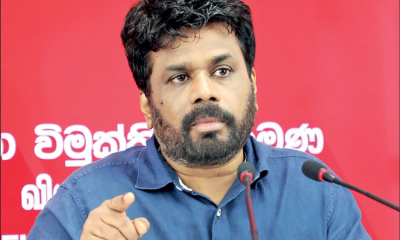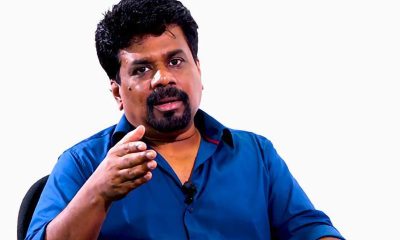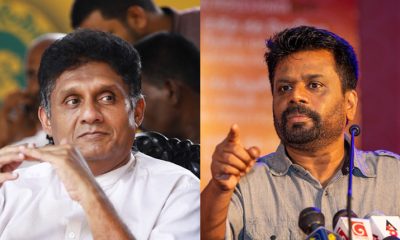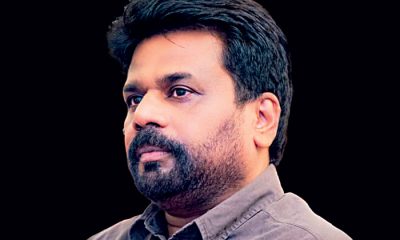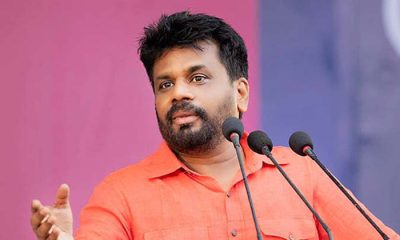Features
Asian Elections and Anura Kumara Dissanayake’s India visit
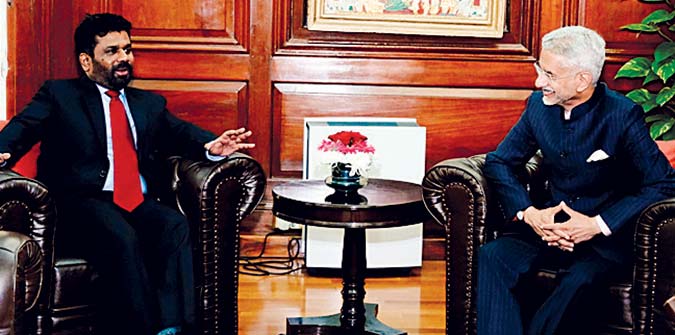
by Rajan Philips
2024 is election year practically everywhere. In South Asia, it is two down and two to go. Bangladesh went first in January, and the governing Awami League won the election as predicted, with the main opposition Bangladesh National Party boycotting the election and the government fielding independent candidates to avoid the embarrassment of winning uncontested seats. Pakistan had its election on February 8, and the people literally gave the finger to rebuke the military’s machinations of the election.
Unlike in Bangladesh, where the government nominated independent candidates, in Pakistan the imprisoned Imran Khan and his proscribed PTI (Pakistan Tehreek-e-Insaf) were forced to field their candidates as independents and were barred from using the Party’s Cricket Bat symbol. Yet they won the most seats, and they would apparently have won a clear majority but for the widely alleged manipulations in vote counting. There are continuing allegations by independent commentators that a clear victory for the PTI was stolen in the wee hours of the election night. In the aftermath of uncertainty, the former alliance of the Pakistan Muslim League of the Sharif brothers and the Bhutto-Zardari led Pakistan’s People’s Party, who ousted Imran Khan from office, is back – cobbling together yet another new government ignoring the people’s verdict.
Next up is India with the mother of all elections which will be held over two months in April and May. As things are, Prime Minister Modi is all set for a threepeat win and form a third Modi-BJP government in succession. The opposition parties are still haggling over how much of a united front opposition they can rationally build upon before it is too late. It seems already too late unless something spectacular were to happen to jolt the opposition fragments to come together to survive, let alone turn back the Modi juggernaut, or simply be run over by it as separate entities. What is more significant than the Modi threepeat is the way in which he is overhauling the character of the Indian state.
What Narendra Modi is doing now to India is what the leaders of Pakistan did to their country at the very moment of its cesarean birth – the creation of a theocratic religious state, spurning the example of India that opted for a modern secular state to overarch a deeply asecular traditional society, where religious differences were/are combustibly vulnerable to political demagoguery. We can keep writing about this till holy cows keep coming home, but the point here is that the recent and ongoing developments in Bangladesh, Pakistan and India provide an insightful South Asian backdrop to the anticipated elections in Sri Lanka, and perhaps more contextually to Anura Kumara Dissanayake’s seemingly geo-locally significant visit to New Delhi.
Sri Lanka is the fourth to go for elections in South Asia. But there was another Asian election this week, in Indonesia, the world’s fourth largest country, the third largest democracy, with the world’s largest Muslim population, and a growing economic powerhouse that is quite ahead of India in almost all economic growth measures. As in many other prospering countries, while there is impressive economic growth there is also a worrying democratic recession. In the presidential election on Wednesday (February 14), Prabowo Subianto, a former army lieutenant general of considerable notoriety under Suharto, and the current Minister of Defense under President Joko Widodo, is reported to be comfortably ahead to win in the first round without a runoff. His Vice Presidential running mate is 36 year old Gibran Rakabuming Raka, the eldest son of President Joko Widodo.
There has not been any reporting of serious voting malpractices, but pre-election shenanigans have raised concerns that the country is on the slippery slope of democratic recession. Joko Widodo and Prabowo Subianto are former rivals who faced off each other in the 2014 and 2019 presidential elections, which Joko won and Prabowo lost. They have since become allies and the highly popular Joko has gone to the extent of supporting Prabowo’s candidacy in 2024 against the nominee of his own Party (the ruling Indonesian Democratic Party of Struggle), Ganjar Pranowo, thereby ensuring Pranowo’s defeat. The alleged reasons for the switch are Joko’s political desire to continue to have a say in the government, and the even stronger paternal desire to give his son a stepping stone as the new Vice President. At 36, Gibran is underage to be Vice President, but the hurdle was removed by the country’s top court with Chief Justice Anwar Usman, Joko’s brother-in-law, casting the deciding vote for his nephew. What is new, and where?
Unlike other Asian countries, including Pakistan where the army calls all the shots, Sri Lanka is the only country where election timing is virtually at the discretion of its CEO, aka the Executive President. At the same time, an incumbent government’s interference in the conduct of elections would seem to have been minimized after 2015, and the first defeat of the Rajapaksas. One would hope that Mr. Ranil Wickremesinghe will not monkey with election timing anymore, and will not try to redeploy the old election dirty tricks of the UNP that go back all the way to Dedigama, long before independence, in the 1936 election to the second State Council election. The UNP was not a Party at that time, but its eventual fathers were in control of the levers of state power even under colonial rule.
AKD’s Visit
The only formal political party in Sri Lanka in 1936 was the Lanka Sama Samaja Party. By 1939, the Party was proscribed, and its leaders were jailed. They broke jail and went to India, not to escape incarceration, but to continue their revolutionary activity and join the struggle in India for freedom from colonial rule. The Indian expedition of the Old Left would be a more appropriate backdrop for commentary on the political implications of Anura Kumara Dissanayake’s visit to India than that cheap gossip in a Sunday Paper, about Lenin allegedly asking Trotsky to go even in a petticoat to procure peace at Brest Litovsk.
Many of the commentaries on the visit were also putt shots aimed at the pre-history of the NPP, or the old history of the JVP, and all of them predicated on the musings of Rohana Wijeweera about Indian Expansionism. Lionel Bopage, one of the repositories of the positive aspects of the JVP experience, has provided a useful overview of the evolution of the JVP’s position on India, but it is unlikely that the JVP’s and NPP’s media detractors would read Bopage or do their own research to provide an objective assessment of AKD’s visit to India.
One striking omission in almost all of the negative commentaries is that their negativity is singularly aimed at AKD and the JVP/NPP, and nothing much negative, if at all, has been said about the Modi government’s imperial invitation to a rising political star in India’s utmost isle. Yet I came across one amusingly innocent piece that politely accused India for its meddlesome manners especially in the matter of the Indo-Lanka Accord of 1987. There is nothing new in this, but what I found to be new is the nugget that Rohana Wijeweera apparently never stopped warning about India’s designs for Sri Lanka and that he based his premonitions on a detailed study of the Indian National Flag that includes The Ashoka Chakra or Dharma Chakra, and the Indian National Emblem that includes an adaptation of the four lions of Ashoka’s Lion Capital.
I don’t know whether Rohana Wijeweera actually said anything or believed that the use of the Chakra and the Lion in India’s national symbols is something that Sri Lankans should remain wary of. But this is the kind of nationalistic adolescence that Anura Kumara Dissanayake would hopefully help not only the JVP but also most Sri Lankans to grow out of, through the vehicle of the NPP. Thankfully, no one in the NPP is in the blabbering habit of Wimal Weerawansa, who once exhibited his high school general knowledge when he insisted in parliament that the Indian National Anthem, Tagore’s immortal rendition in Bengali, is only sung in Hindi! Those days are behind the Sri Lankan electorate, and there is much to look ahead.
Just on the question of the Chakra on the Indian Flag, there have been a few interpretations of it. Sarvapalli Radhakrishnan, the vocational Philosopher, India’s first Vice President and later President, has interpreted the Chakra as being representative of dharma and law. Prime Minister Nehru was more practical – the Chakra is symmetrical on the flag and easily reproduceable than Mahatma Gandhi’s Spinning Wheel that had been on the flag of the Congress during the independence struggle.
Sri Lankan Historian S. Arasaratnam, one of the more objective scholars of nationalism among Sri Lankan academics, has interpreted the Chakra as symptomatic of the efforts of India’s founding fathers (in the Constituent Assembly) to lift the emerging nation above the fray of its religious differences. Then comes along Modi after 75 years and plunges the country into a new temple triumphalism.
Those who ask the JVP to explain its rapprochement with India in light of its virulent opposition to the Indo Lanka accord 37 years ago, have not been consistent in asking others who too had been opposed to India in more ways than one and even long before the signing of the Indo Lanka accord.
NM Perera pithily characterized the foreign policy of DS Senanayake and the first UNP government as “Anglo mania and India phobia.” That mindset has been quite the norm in many political circles. It continued 30 years later with President Jayewardene at least until 1983. Even the SLFP has not been averse it to it despite later claims of a special relationship with the Nehru family in India.
As nuggets go, James Manor in his biography of SWRD Bandaranaike, The Expedient Utopian, recounts an anecdote from the 1930s, when Lord Mountbatten was stationed in Kandy and Nehru was visiting the island. Mountbatten suggested to one of SWRD Bandaranaike’s sisters that they should invite the visiting Indian leader for tea at Horagolla. Pat came the rebuff, “we do not sup with coolies.” That was more ignorance than snobbery, but the nugget would go down well in Modi circles in today’s India.
As well, as political analysis goes, one of the academic theses on the Indo Lanka Accord has been that the accord severed the linkages between the Sri Lankan state establishment and the social base of Sinhala Buddhist nationalism. The argument continued that what was ruptured in 1987 was restored only after 2005 when Mahinda Rajapaksa became President, thanks to the not so hidden hand support of the LTTE. Yet it has been a truism among Sinhala ultranationalists that Mahinda Rajapaksa is the only authentic Sinhala nationalist leader because everyone else was compromised by English.
Now that the Rajapaksas are gone, and the Supreme Court has ruled why, there might be revisitations of the old thesis. One hypothesis could be that the tragedy of the Rajapaksas is that they were used as dummies by others, who were otherwise political nobodies, for ventriloquistic claims on everything from nationalism to the economy, and from central banking to organic fertilizer.
As I wrote recently, the peacefully involuntary departure of the Rajapaksas has created the biggest vacuum to be filled in this election year. Anura Kumara Dissanayake has emerged as the most likely contender to fill that void, but in altogether different, and hopefully positive, ways. His trip to Delhi enhances that assessment, and even expectations, except for those who hold against Mr. Dissanayake the sins of his predecessors but will not subject any other political leader to such a demanding postmortem.
Features
SL urged to use GSP+ to the fullest to promote export development
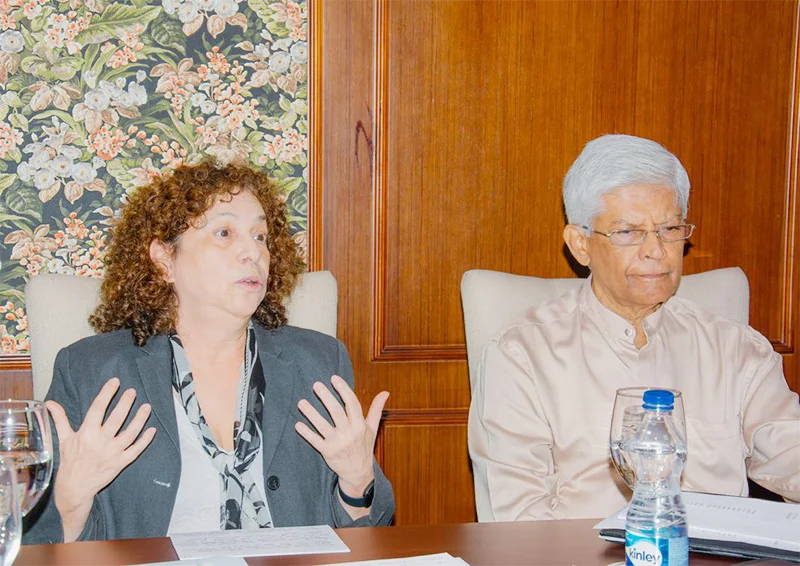
 Sri Lanka needs to take full stock of its current economic situation and use to the maximum the potential in its GSP+ facility for export sector growth. In the process, it should ensure that it cooperates fully with the European Union. The urgency of undertaking these responsibilities is underscored by the issues growing out of the recent US decision to sweepingly hike tariffs on its imports, though differentially.
Sri Lanka needs to take full stock of its current economic situation and use to the maximum the potential in its GSP+ facility for export sector growth. In the process, it should ensure that it cooperates fully with the European Union. The urgency of undertaking these responsibilities is underscored by the issues growing out of the recent US decision to sweepingly hike tariffs on its imports, though differentially.
These were principal ‘takes’ for participants in the Pathfinder Foundation’s Ambassadors’ Roundtable forum held on April 8th at the Colombo Club of the Taj Samudra. The main presenter at the event was Ms. Carmen Moreno Raymundo, Ambassador of the European Union to Sri Lanka and the Maldives. The forum was chaired by Ambassador Bernard Goonetilleke, Chairman, Pathfinder Foundation. The event brought together a cross-section of the local public, including the media.
Ms. Moreno drew attention to the fact Sri Lanka is at present severely under utilizing its GSP+ facility, which is the main means for Sri Lanka to enter the very vast EU market of 450 million people. In fact the EU has been Sri Lanka’s biggest trading partner. In 2023, for instance, total trade between the partners stood at Euros 3.84 billion. There is no greater market but the EU region for Sri Lanka.
‘However, only Sri Lanka’s apparel sector has seen considerable growth over the years. It is the only export sector in Sri Lanka which could be said to be fully developed. However, wider ranging export growth is possible provided Sri Lanka exploits to the fullest the opportunities presented by GSP+.’
Moreno added, among other things: ‘Sri Lanka is one among only eight countries that have been granted the EU’s GSP+ facility. The wide-ranging export possibilities opened by the facility are waiting to be utilized. In the process, the country needs to participate in world trade in a dynamic way. It cannot opt for a closed economy. As long as economic vibrancy remains unachieved, Sri Lanka cannot enter into world trading arrangements from a strong position. Among other things, Sri Lanka must access the tools that will enable it to spot and make full use of export opportunities.
‘Sri Lanka must facilitate the private sector in a major way and make it possible for foreign investors to enter the local economy with no hassle and compete for local business opportunities unfettered. At present, Lanka lacks the relevant legal framework to make all this happen satisfactorily.
‘Sri Lanka cannot opt for what could be seen as opaque arrangements with bilateral economic partners. Transparency must be made to prevail in its dealings with investors and other relevant quarters. It’s the public good that must be ensured. The EU would like to see the local economy further opening up for foreign investment.
‘However, it is important that Sri Lanka cooperates with the EU in the latter’s efforts to bring about beneficial outcomes for Sri Lankans. Cooperation could be ensured by Sri Lanka fully abiding by the EU conditions that are attendant on the granting of GSP+. There are, for example, a number of commitments and international conventions that Sri Lanka signed up to and had promised to implement on its receipt of GSP+ which have hitherto not been complied with. Some of these relate to human rights and labour regulations.
‘Successive governments have pledged to implement these conventions but thus far nothing has happened by way of compliance. GSP+ must be seen as an opportunity and not a threat and by complying with EU conditions the best fruits could be reaped from GSP+. It is relevant to remember that GSP+ was granted to Sri Lanka in 2005. It was suspended five years later and restored in 2017.
‘The importance of compliance with EU conditions is greatly enhanced at present in view of the fact that Sri Lanka is currently being monitored by the EU with regard to compliance ahead of extending GSP+ next year. A report on Sri Lanka is due next year wherein the country’s performance with regard to cooperating with the EU would be assessed. The continuation of the facility depends on the degree of cooperation.
‘A few statistics would bear out the importance of Sri Lanka’s partnership with the EU. For example, under the facility Sri Lanka benefits from duty free access in over 66% of EU tariff lines. The highest number of tourist arrivals in Sri Lanka in 2023 was from the EU’s 27 member states. Likewise, the EU’s 27 member states rank second in the origin of inflows of foreign exchange to Sri Lanka; with Italy, France and Germany figuring as the main countries of origin. Eighty five percent of Sri Lanka’s exports to the EU market benefits from GSP+. Thus, the stakes for the country are high.’
Meanwhile, President, In-house Counsel & Legal Advisor, The European Chamber of Commerce of Sri Lanka, John Wilson said: ‘GSP+ should be seen as not only an opportunity but also as a necessity by Sri Lanka in the current international economic climate. ‘Implementation of local laws is what is needed. Considering the pressures growing out of the US imposed new tariff regime, a good dialogue with the EU is needed.
‘Sri Lanka’s level of business readiness must be upped. Among the imperatives are: An electronic procurement process, Customs reforms, a ‘National Single Window’, stepped-up access to land by investors, for example, a clear policy framework on PPPs and reform of the work permits system.’
It ought to be plain to see from the foregoing that Sri Lanka cannot afford to lose the GSP+ facility if it is stepped-up economic growth that is aimed at. It would be in Sri Lanka’s best interests to remain linked with the EU, considering the aggravated material hardships that could come in the wake of the imposition of the US’ new tariff regime. Sri Lanka would need to remain in a dialogue process with the EU, voice its reservations on matters growing out of GSP+, if any, iron out differences and ensure that its national interest is secured.
Features
SENSITIVE AND PASSIONATE…
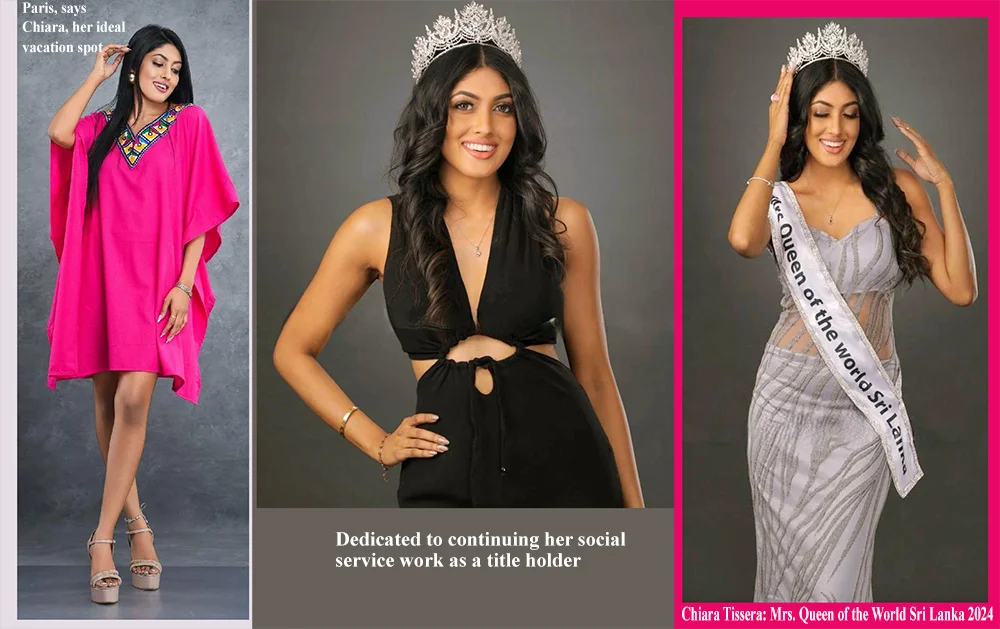
Chit-Chat
Chiara Tissera
Mrs. Queen of the World Sri Lanka 2024, Chiara Tissera, leaves for the finals, in the USA, next month
I had a very interesting chat with her and this is how it all went:
1. How would you describe yourself?
I am a sensitive and passionate individual who deeply cares about the things that matter most to me. I approach life with a heart full of enthusiasm and a desire to make meaningful connections.
2. If you could change one thing about yourself, what would it be?
Actually, I wouldn’t change a thing about myself because the person I am today, both inside and out, is the result of everything I’ve experienced. Every part of me has shaped who I am, so I embrace both my strengths and imperfections as they make me uniquely me.
3. If you could change one thing about your family, what would it be?
If there’s one thing I could change about my family, it would be having my father back with us. Losing him six years ago left a void that can never be filled, but his memory continues to guide and inspire us every day.
4. School?
I went to St. Jude’s College, Kurana, and I’m really proud to say that the lessons I gained during my time there have shaped who I am today. My school and teachers instilled in me values of hard work, perseverance and the importance of community, and I carry those lessons with me every day. I was a senior prefect and was selected the Deputy Head Prefect of our college during my tenure.
5. Happiest moment?
The happiest moment of my life so far has been winning the Mrs. Sri Lanka 2024 for Queen of the World. It was a dream come true and a truly unforgettable experience, one that fills me with pride and gratitude every time I reflect on it.
6. What is your idea of perfect happiness?
Happiness is a deeply personal and multifaceted feeling that often comes from a sense of contentment, fulfillment and well-being. For me, perfect happiness is in moments of joy, peace and accomplishments … and also being surrounded by my loved ones.
7. Are you religious?
Yes, I’m a very religious person. And I’m a firm believer in God. My faith guides me through life, providing strength, dedication and a sense of peace in every situation. I live by the quote, ‘Do your best, and God will do the rest.’
8. Are you superstitious?
I’m not superstitious. I believe in making my own decisions and relying on logic and faith rather than following superstitions.
9. Your ideal guy?
My ideal guy is my husband. He is compassionate, understanding and is always there to support me, no matter what. He’s my rock and my best friend – truly everything I could ever want in a partner.
10. Which living person do you most admire?
The living person I admire the most is definitely my mummy. Her strength, love and unwavering support has shaped me into who I am today. She is my role model and she inspires me every day with her wisdom and kindness.
11. Your most treasured possession?
My most treasured possession is my family. They are the heart of my life, providing me with love, support and strength. Their presence is my greatest blessing.
12. If you were marooned on a desert island, who would you like as your companion?
I would like to have my spouse as my companion. Together, we could make the best of the situation, supporting each other, sharing moments of laughter and finding creative ways to survive and thrive.
13. Your most embarrassing moment?
There’s quite a few, for sure, but nothing is really coming to mind right now.
14. Done anything daring?
Yes, stepping out of my comfort zone and taking part in a pageant. I had no experience and was nervous about putting myself out there, but I decided to challenge myself and go for it. It pushed me to grow in so many ways—learning to embrace confidence, handle pressure, and appreciate my own uniqueness. The experience not only boosted my self-esteem but also taught me the value of taking risks and embracing new opportunities, even when they feel intimidating.”
15. Your ideal vacation?
It would be to Paris. The city has such a magical vibe and, of course, exploring the magical Eiffel Tower is in my bucket list. Especially the city being a mix of history culture and modern life in a way that feels timeless, I find it to be the ideal vacation spot for me.
16. What kind of music are you into?
I love romantic songs. I’m drawn to its emotional depth and the way they express love, longing a connection. Whether it’s a slow ballad, a classic love song or a more modern romantic tune these songs speak to my heart.
17. Favourite radio station?
I don’t have a specific radio station that I like, but I tend to enjoy a variety of stations, depending on my mood. Sometimes I’ll tune into one for a mix of popular hits, other times I might go for something more relaxing, or a station with a certain vibe. So I just like to keep it flexible and switch it up.
18. Favourite TV station?
I hardly find the time to sit down and watch TV. But, whenever I do find a little spare time, I tend to do some spontaneous binge – watching, catching whatever interesting show is on at that moment.
19 What would you like to be born as in your next life?
Mmmm, I’ve actually not thought about it, but I’d love to be born as someone who gets to explore the world freely – perhaps a bird soaring across continents.
20. Any major plans for the future?
Let’s say preparing and participating in the international pageant happening in the USA this May. It’s an exciting opportunity to represent myself and my country on a global stage. Alongside this, I am dedicated to continuing my social service work as a title holder, striving to make a meaningful difference in the lives of others through my platform.
Features
Fresher looking skin …

 The formation of wrinkles and fine lines is part of our ageing process. However, if these wrinkles negatively impact appearance, making one look older than they actually are, then trying out some homemade remedies, I’ve listed for you, this week, may help in giving your skin a fresher look.
The formation of wrinkles and fine lines is part of our ageing process. However, if these wrinkles negatively impact appearance, making one look older than they actually are, then trying out some homemade remedies, I’ve listed for you, this week, may help in giving your skin a fresher look.
* Banana:
Bananas are considered to be our skin’s best friend. They contain natural oils and vitamins that work very perfectly to boost our skin health. Skincare experts recommend applying the banana paste to the skin.
Take a ripe banana and mash a quarter of it until it becomes a smooth paste. Apply a thin layer of the banana paste on your skin and allow it to sit for 15 to 20 minutes before washing it off with warm water.
* Olive Oil:
Olive oil works as a great skin protector and many types of research suggest that even consuming olive oil may protect the skin from developing more wrinkles. Olive oil contains compounds that can increase the skin’s collagen levels. Yes, olive oil can be used as a dressing on your salads, or other food, if you want to consume it, otherwise, you can apply a thin layer of olive oil on your face, neck and hands and let it stay overnight.
* Ginger:
Ginger serves to be a brilliant anti-wrinkle remedy because of the high content of antioxidants in it. Ginger helps in breaking down elastin, which is one of the main reasons for wrinkles. You can have ginger tea or grate ginger and have it with honey, on a regular basis.
* Aloe Vera:
The malic acid present in Aloe Vera helps in improving your skin’s elasticity, which helps in reducing your wrinkles. Apply the gel once you extract it from the plant, and leave it on for 15-20 minutes. You can wash it off with warm water.
* Lemons:
Lemons contain citric acid, which is a strong exfoliant that can help you get rid of your dead skin cells and wrinkles. Also, as an astringent and a cleansing agent, it helps to fade your wrinkles and fine lines. You can gently rub a lemon slice in your wrinkled skin and leave it on for 10-15 minutes. Rinse afterwards and repeat this process two to three times a day.
* Coconut Oil:
Coconut oil contains essential fatty acid that moisturises the skin and helps to retain its elasticity. You can directly apply the coconut oil, and leave it overnight, after gently massaging it, for the best results.
-

 Business4 days ago
Business4 days agoColombo Coffee wins coveted management awards
-

 Business6 days ago
Business6 days agoDaraz Sri Lanka ushers in the New Year with 4.4 Avurudu Wasi Pro Max – Sri Lanka’s biggest online Avurudu sale
-

 Features5 days ago
Features5 days agoStarlink in the Global South
-

 Business7 days ago
Business7 days agoStrengthening SDG integration into provincial planning and development process
-

 Business6 days ago
Business6 days agoNew SL Sovereign Bonds win foreign investor confidence
-

 Features2 days ago
Features2 days agoSri Lanka’s Foreign Policy amid Geopolitical Transformations: 1990-2024 – Part III
-

 Features5 days ago
Features5 days agoModi’s Sri Lanka Sojourn
-

 Midweek Review2 days ago
Midweek Review2 days agoInequality is killing the Middle Class


